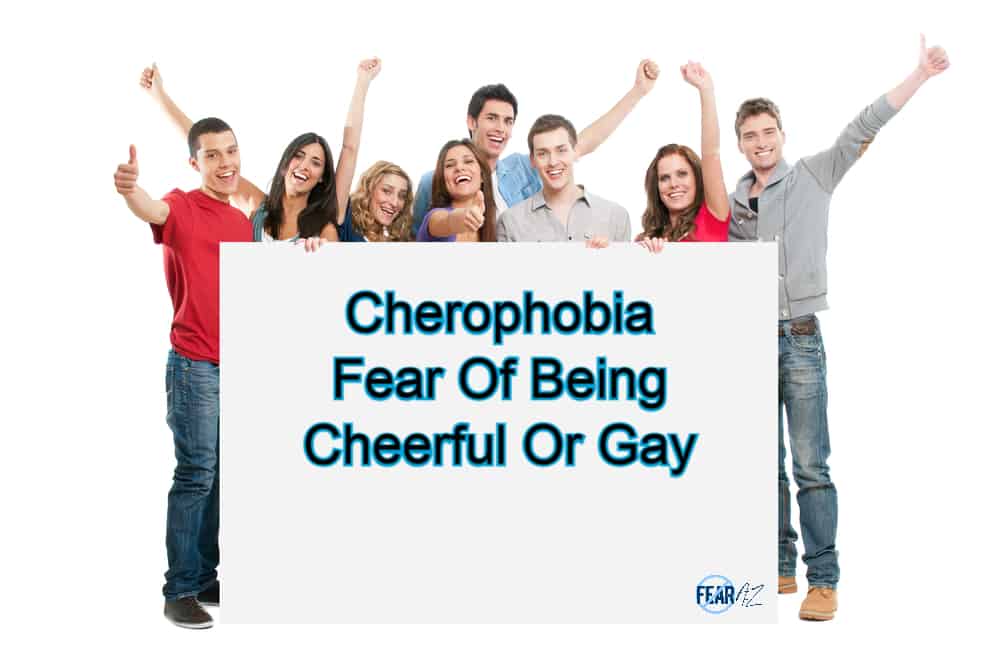Share This Article
Understanding Cherophobia: Overcoming the Fear of Embracing Happiness and Authenticity
Do you feel panicked when you receive an invitation for a joyous occasion such as a birthday party or a wedding? Are you afraid of activities or hobbies that evoke happiness? Do you feel paranoid after you smile or laugh?
If the answer is yes, you may be dealing with cherophobia, which is the fear of being cheerful, gay, or happy.
Cherophobia can be a baffling fear to come to terms with, and understandably so. While the entire world is running towards things that make them happy, you are running away. Explaining this fear to others and conveying how you feel can be difficult.
But don’t worry. You’re not alone in dealing with cherophobia, and there are treatments for this psychological condition. And with proper care and treatment, you can enjoy being happy, as everyone should.
What Is Cherophobia?
The term “cherophobia” comes from the Greek word chero meaning “to rejoice” and phobos meaning “fear.” A person suffering from cherophobia has an aversion to happiness.
There aren’t many studies on this phobia. In fact, it’s not even included in the Diagnostic and Statistical Manual of Mental Disorders (DSM-5), the manual that lists all the phobias. However, with an increasing number of people reporting this fear, there is a gradual recognition of cherophobia.
One suffering from cherophobia is not a sad person, but someone who actively avoids participating in activities, events, etc. that will make them feel happy.
The aversion to or fear of happiness is an uncommon fear. And although irrational, it can have major repercussions in a person’s life.

Symptoms of Cherophobia
The symptoms of cherophobia are very similar to other anxiety disorders. A person may experience these symptoms in varying degrees of severity. They can either experience one or two symptoms at a time or multiple symptoms simultaneously.
Physical Symptoms
- Shivering
- Hot and cold flashes
- Headache
- Rejecting opportunities/invitations for happy events
- Sweating
- Numbness
- Ringing in ears
- Heart palpitations
- Increased blood pressure
Mental/Emotional Symptoms
- Anticipating death
- Anxiety
- Panic attack
- Anticipating something bad
- Considering oneself as a bad person
- Refusing to be a part of anything that may make them feel happy or joyous
Causes of Cherophobia
Like all other phobias, the exact cause of cherophobia is unknown. Several factors can lead to a person developing a phobia of being happy.
Personal Experience
A person could have experienced something really happy followed by something bad happening. In such an event, the person may anticipate something bad to happen after a joyous occasion and will be paranoid about feeling happy.
Learned Behavior
Cherophobia could also be a learned behavior. If someone close to you, such as a parent, sibling, or friend, has a phobia of happiness, their acute description of what happens, how they feel, etc. can significantly impact your views, too. It can lead you to follow the same thought process. This is especially true in cases where you live together or when there are repeated reminders of the phobia.
Introvert
A person’s overall social behavior may also influence how they perceive social occasions and happiness. Someone who is an introvert is more prone to developing anxiety disorders including cherophobia than an extrovert.
Perfectionism
Someone who is a perfectionist may be more prone to developing a phobia of happiness. Perfectionists tend to feel unproductive and fear getting involved in joyous events will distract them from their goals. They may try to avoid any activity that is fun. Some believe the time utilized doing joyful things is time wasted when they could instead use this time for more “productive” things.
Genetic Predisposition and Depression
Some people are genetically predisposed to mental health issues. People with depression or anxiety disorders, for example, are more prone to developing cherophobia. Those with depression, in particular, tend to experience a lack of hope and happiness, which can lay the groundwork for developing a phobia of happiness.
Treatment of Cherophobia
As cherophobia is not a recognized disorder, there is no defined treatment. However, as it is an anxiety disorder, treatment plans that work for other anxiety disorders or phobias can also help patients with cherophobia.
Here are the two main ways to go about treating the fear of happiness:
Self-Help
When dealing with phobias and other mental health issues, self-help can be your first line of defense. Several techniques can help you deal with the anxiety and panic that result from a phobia.
Here are some beneficial relaxation techniques you can practice:
- Deep breathing
- Counting numbers
- Meditation
- Exercising
- Yoga
Such lifestyle changes can be helpful when one is faced with their triggers.
Journaling is another self-help tool that can help you understand your phobia better. It will give words to your thoughts and help you separate rational thoughts from irrational ones.
Talking with your loved ones is also an important step in your healing journey. If you feel uncomfortable talking to friends and family, there are also many online and in-person support groups where you can talk about your fears and connect with others who are going through something similar.
Professional Help
Medical professionals are experts in the field who know how to deal with phobias, including cherophobia. They will be able to recommend a treatment plan based on your symptoms and the severity of your fear. The most common therapies used by professionals are:
- Cognitive behavioral therapy
- Hypnotherapy
- Exposure therapy
- Mindfulness-based interventions
- Medications
Learning to Cope with Cherophobia
Dealing with cherophobia can be exhausting, to say the least. Fear of experiencing happiness or joy can be alienating. It not only prevents you from participating in various celebrations and holidays for fear of triggering your phobia, but it can also make you want to avoid being around friends and family who are happy.
Talking to your loved ones about your phobia and anxiety and seeking professional help is key. You can pair professional therapy with some of the self-help methods listed above, and you’ll soon be making progress in your journey to achieve mental and physical well-being.
Conclusion
Cherophobia, the fear of happiness, can make a person’s life miserable. It not only deprives them of happiness but also affects their social, personal, and professional life. Fortunately, there are various treatments that can help one deal with and overcome this phobia. Reach out for help and you’ll soon find yourself experiencing joyful holiday celebrations with loved ones.



